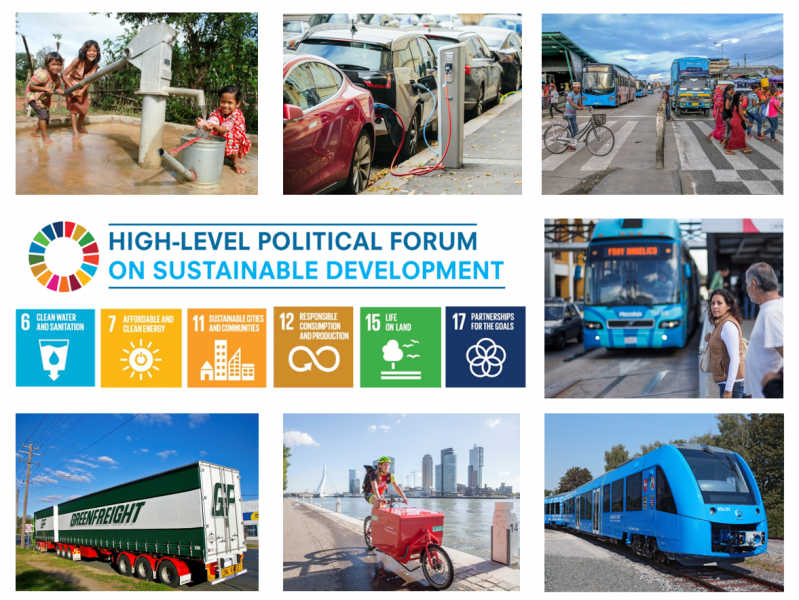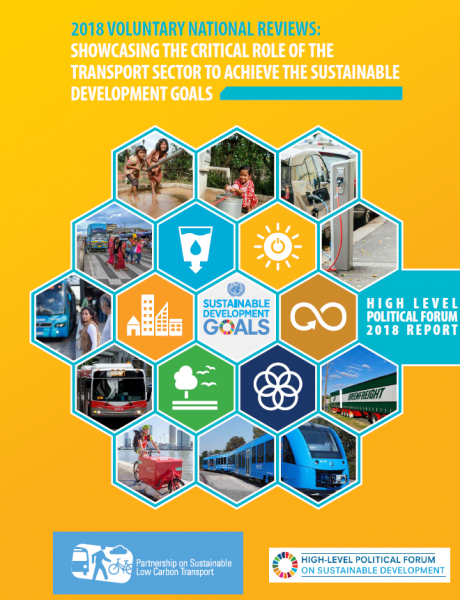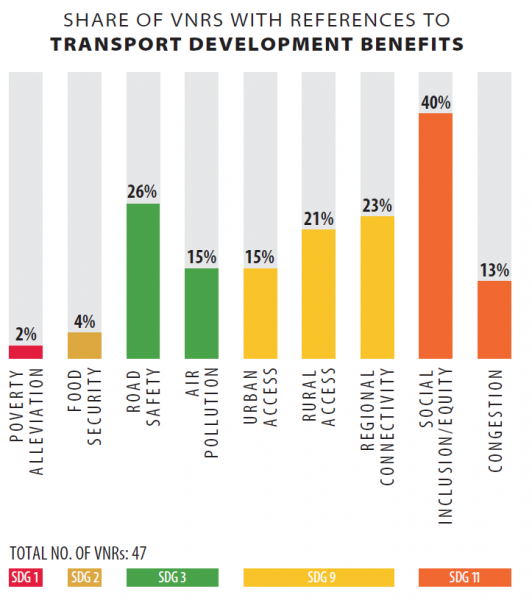Final SLoCaT Report on 2018 Voluntary National Reviews: Showcasing the Critical Role of the Transport Sector to Achieve the Sustainable Development Goals
The High-level Political Forum (HLPF) on Sustainable Development is the United Nation (UN)’s central platform for the follow-up and review of the 2030 Agenda and the 17 Sustainable Development Goals (SDGs). The HLPF in 2018, held from 9 to 18 July 2018, focuses on the theme, “Transformation towards sustainable and resilient societies.” SDGs under review at the HLPF 2018 include SDG 6 (Clean Water and Sanitation), SDG 7 (Affordable and Clean Energy), SDG 11 (Sustainable Cities and Communities), SDG 12 (Responsible Consumption and Production), SDG 15 (Life on Land) and SDG 17 (Partnership for the Goals).

A key reporting mechanism within the HLPF is the Voluntary National Review (VNR) process which aims to facilitate the sharing of experiences among countries, including successes, challenges and lessons learned, with a view to accelerating the implementation of the 2030 Agenda.
Although sustainable transport is not represented by a standalone SDG in the 2030 Agenda, it is mainstreamed in a direct or indirect manner into several SDGs, especially those related to poverty alleviation; food security; access to health services, clean water, education, and employment; gender equality; energy; infrastructure; cities and human settlements; energy and food consumption, and climate change.
 Since the first HLPF in 2016, the Partnership on Sustainable, Low Carbon Transport (SLoCaT) has been conducting analyses on the VNRs submitted each year. SLoCaT continued to track the references to transport in the 47 VNRs submitted to HLPF in 2018.
Since the first HLPF in 2016, the Partnership on Sustainable, Low Carbon Transport (SLoCaT) has been conducting analyses on the VNRs submitted each year. SLoCaT continued to track the references to transport in the 47 VNRs submitted to HLPF in 2018.
Final report with analysis on the 47 VNRs can be downloaded here.
Results of the analysis finds that despite a slight improvement from 2016 and 2017, gaps remain in reporting on transport and its contribution to sustainable development in VNRs submitted in 2018. In 2018, references to the transport sector have been included in 94% of the VNRs submitted so far (44 out of 47 VNRs). Nevertheless, there remains a tendency in a number of VNRs to merely report on outputs (e.g. kilometers of highways built or kilometers of rail constructed) without demonstrating linkages to broader development goals.

Figure 1: Share of VNRs with references to transport development benefits (Source: SLoCaT 2018)
More than 80% of VNRs refer to the role of sustainable transport in achieving the SDGs but only 12 out of 40 VNRs (26%) offer considerable information with specific cases and policy examples on sustainable transport. 17% of VNRs cited one or two policy examples related to sustainable transport and 36% of VNRs acknowledge the need for sustainable transport but fall short of offering any concrete evidence and policy measures to demonstrate their commitment to achieve it.
Moreover, data to illustrate progress on transport-related SDGs are not always provided in the VNRs in a consistent format or level of detail, which creates challenges to measure progress over time. 38% of VNRs submitted in 2018 have provided data to demonstrate their progress in implementing SDGs 3, SDG 7, SDG 9 and SDG 11, which is a significant increase from last year’s data reporting (18% of VNRs submitted in 2017 reported data related to the transport sector). However, there remain inconsistencies in the formats, units, and time spans of the limited data sets provided in these VNRs, which is a common issue to the previous two rounds of VNRs.
There is also need to set more specific, quantified targets aligned with the transport-related SDGs. In 2018, 15 countries (or 32% of VNRs) include targets for sustainable transport development, which is a significant increase from 2017. The majority of targets reported are related to SDG 7. Very few targets are being reported on road safety (SDG 3.6.1), rural access (SDG indicator 9.1.1), and access to inclusive public transport (SDG 11.2.1). No quantified targets have been reported for SDG 9.1.2 on passenger and freight volume and SDG 12.c.1 on fossil fuel subsidies.
The analysis also finds that transport does not appear to be receiving a comparable increase in attention in the SDG progress reports released by the UN Secretary-General. In the new report in 2018, only very general descriptions were made related to transport financing and urban transport.
The SLoCaT Partnership believes that there is further potential to demonstrate the critical role of sustainable transport in this SDG implementation and review process. VNRs can create a more comprehensive vision of sustainable transport development if countries can emphasize more prominently with specific policy examples and case studies that transport is a vital, cross-cutting sector which enables all other sectors to implement the 2030 Agenda.
Updated draft report on the results of SLoCaT’s anlaysis on the VNRS in 2018 is available here.